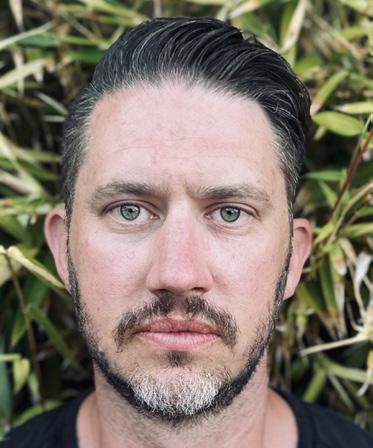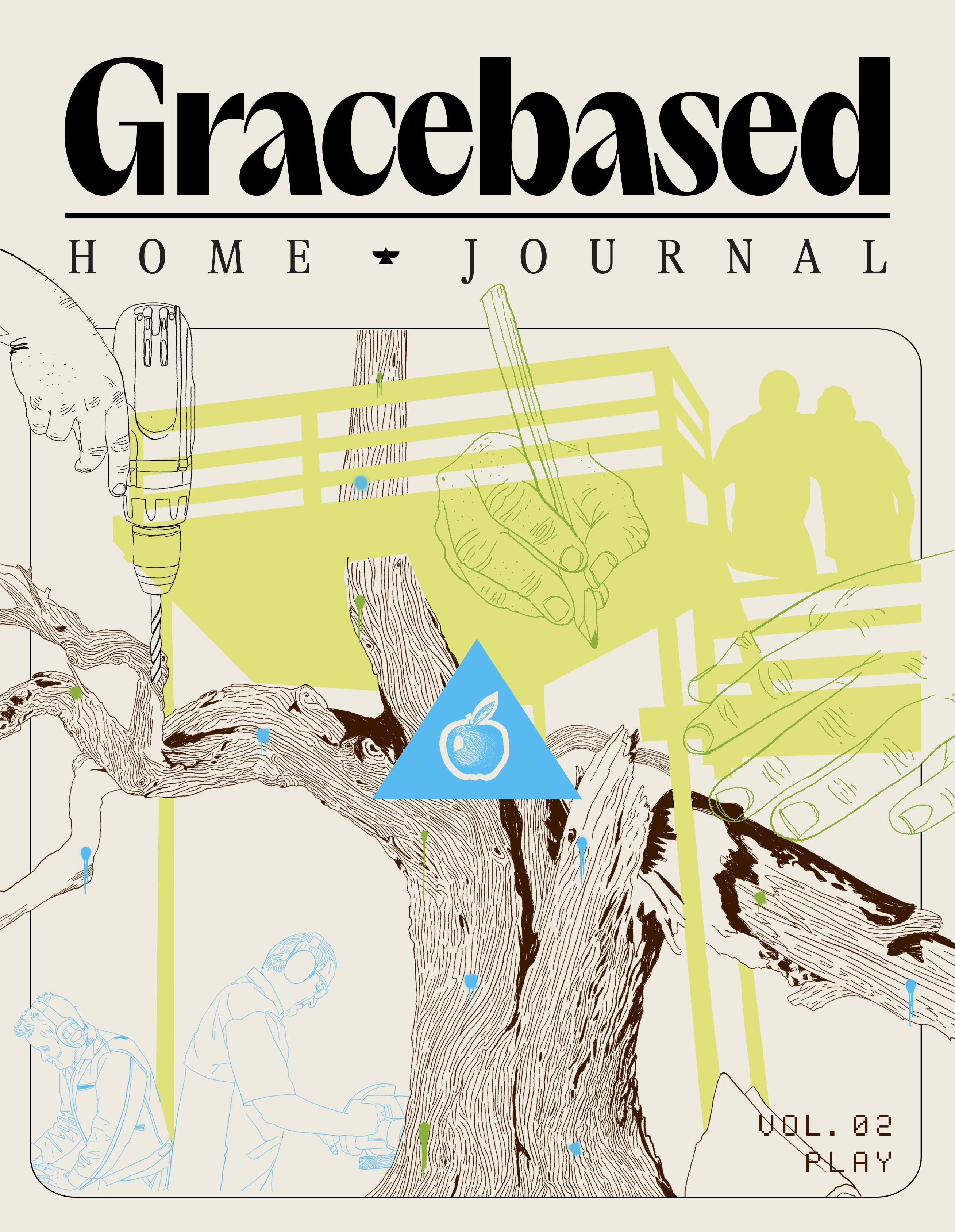
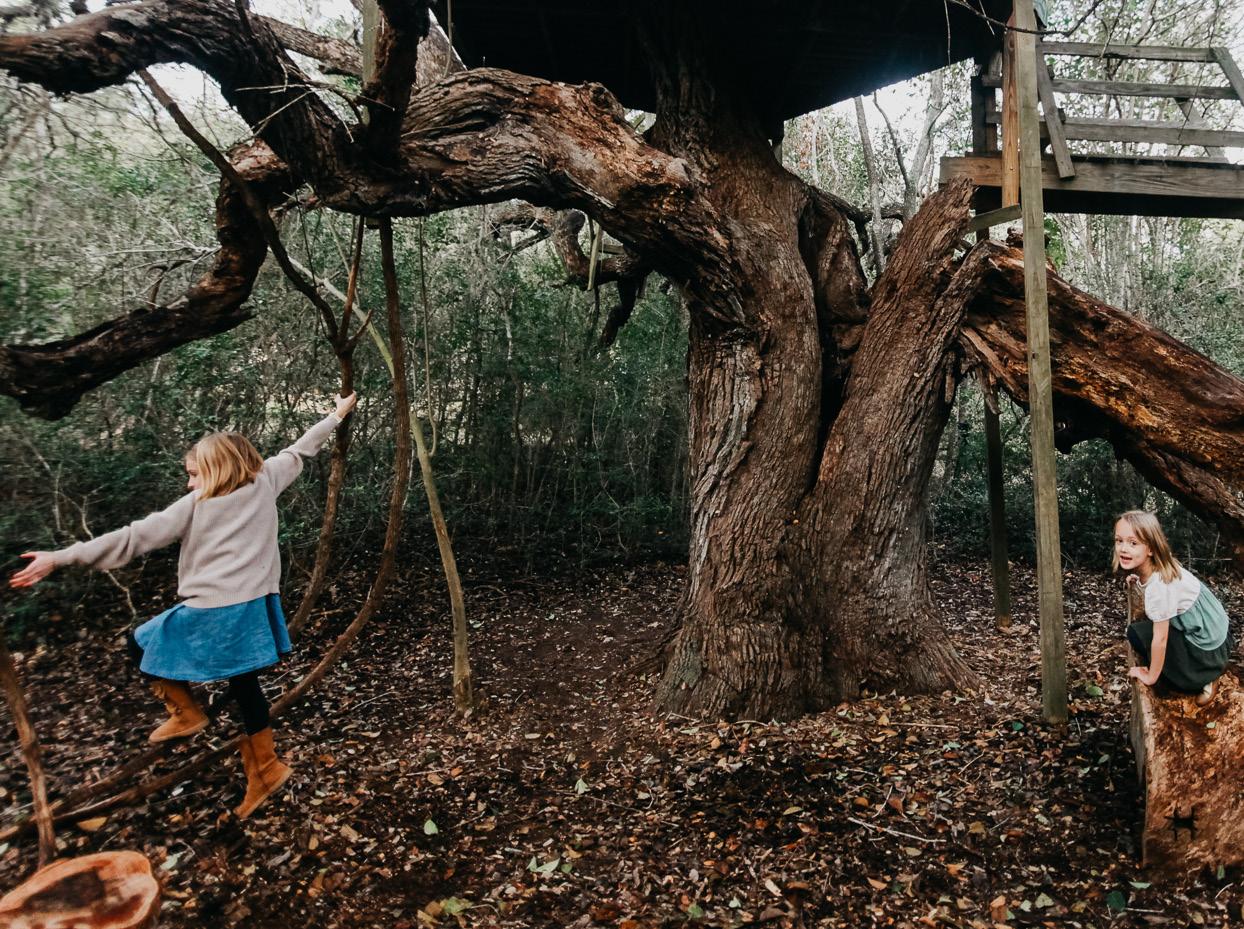





By C.C. Kimmel
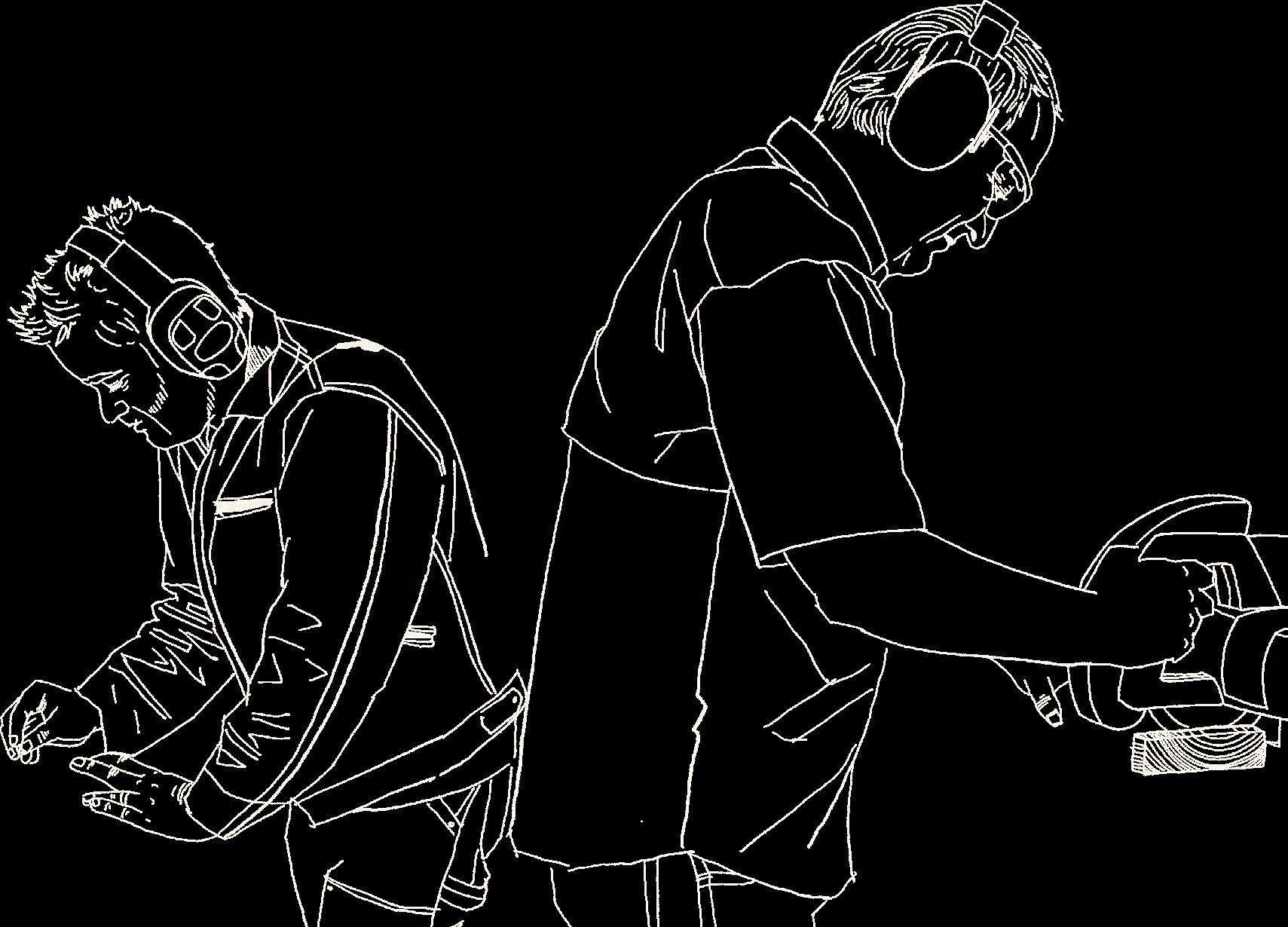

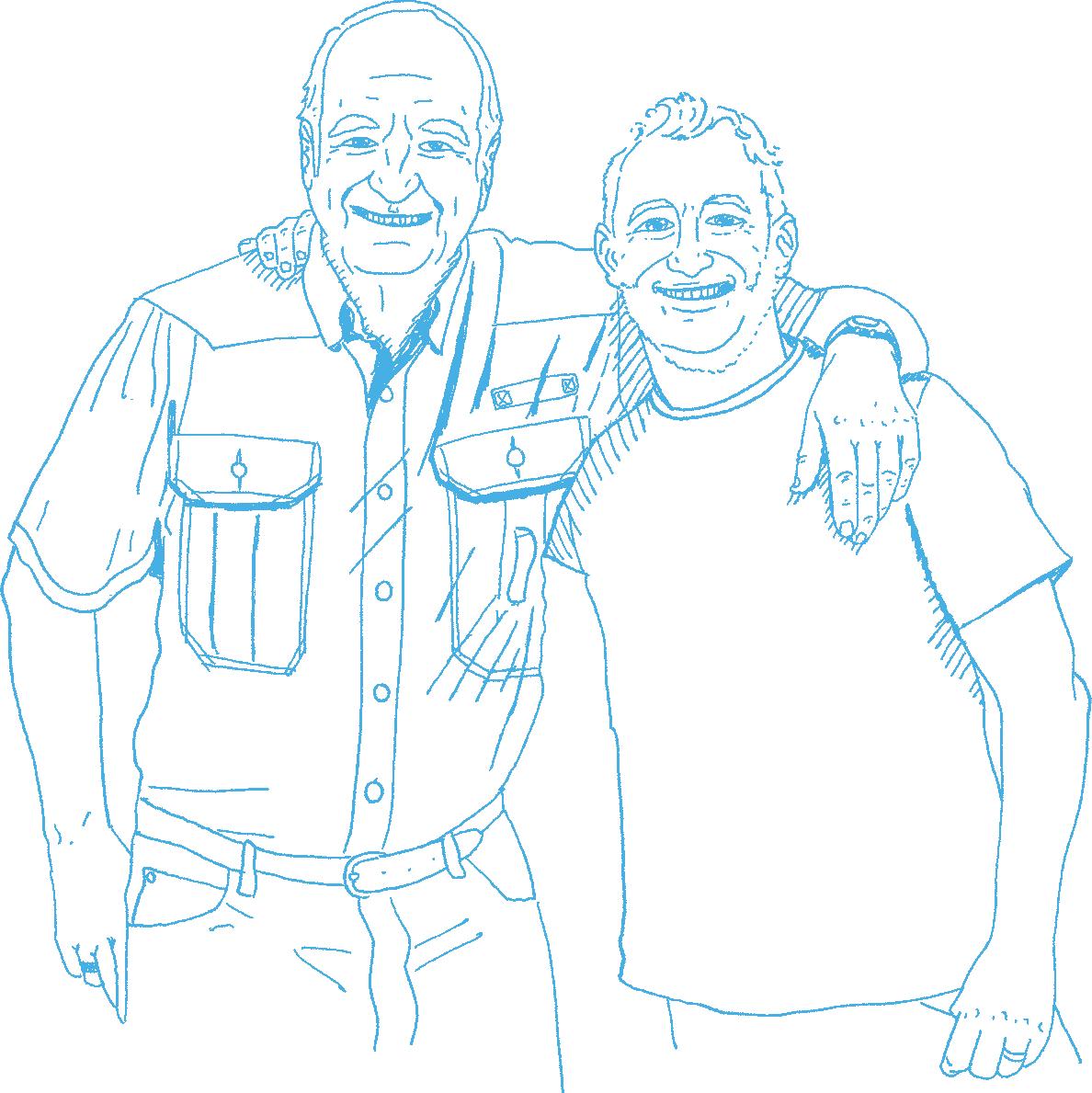
The story of Monkey City began long before plans were drawn and its name determined. Before the first nail went into the wood-beamed ladder leading to the main deck. Before Doug and Laura Kaspar built the Colonial Williamsburg replica home on their 95 acres of Central Texas rolling fields. Before Christopher and Kyle advanced through the thicket with paintball guns in hand. Before the cows broke through the fence into the garden. Before the Kaspars ever walked the Indian paintbrush-dotted hills leading to the towering live oak.
It all started, like most good stories, before anyone knew it would be a story. It started with a storm. No one was there to see it. Just the quiet witness of the youpan thicket surrounding the towering tree and the animals hiding within. Amid the wind and thunder and rain, a lightning streamer crawled up the roots, through the branches and crown, shooting to connect with the stepped leader descending from the clouds looming above. The oak tree, already over a hundred years old, felt its first shock of age as its youthful core began to crack and start its slow but steady journey to decay. Once a sapling in the same fields Sam Houston rode through on the way to Gonzalez, the tree that would ultimately be home to Monkey City began its end.
Doug Kaspar didn’t know this the day he surveyed his land from his back deck. On that particular day, as he studied the tree’s silhouette looming over that thicket, all he saw was an opportunity for magic.
Doug was no stranger to the area. The Kaspars had lived in Shiner, Texas, since it was settled in the late 1800s. Always industrious and curious, Doug’s great-great-grandfather founded Kaspar Wireworks to make corn shuck baskets and horse muzzles. Now, five generations later, Doug led the team in the engineering department, which–at that time–was dedicated to manufacturing the metal case racks that were being used all over the country for selling newspapers.
That ancient live oak stood in the thicket less than a hundred yards behind their house. After chewing on his new idea for a while, Doug invited Laura to walk with him through the mist of the early morning dew until they were in the shadow of that magnificent tree. Once there, he told her of his plans. What they imagined together that day would become their two sons’ home base for many years to come. It was to be a core memory of laughter, scraped knees, love, and youth. A kingdom of secrets and dreams. A town mainstay and a sacred hiding place.
Christopher and Kyle, 6 and 3, respectively, were given two options: Ewok Village or Monkey City. After a quick huddle, the brothers decided. Doug began construction on Monkey City the next day.
The gnarled, sprawling tree was tailor-made for an elaborate play structure. After climbing the ladder to the landing, Monkey City opened up to the main deck built around the tree’s central trunk. Thick extensions of the trunk rose in each direction above the deck and would later become the anchor for the upper landing and lookout. Perched on a lower limb, a smaller platform sat connected by a bridge from the main deck.
Doug hung plastic water bottles filled with sand from the outer branches for BB gun target practice. Laura supplied
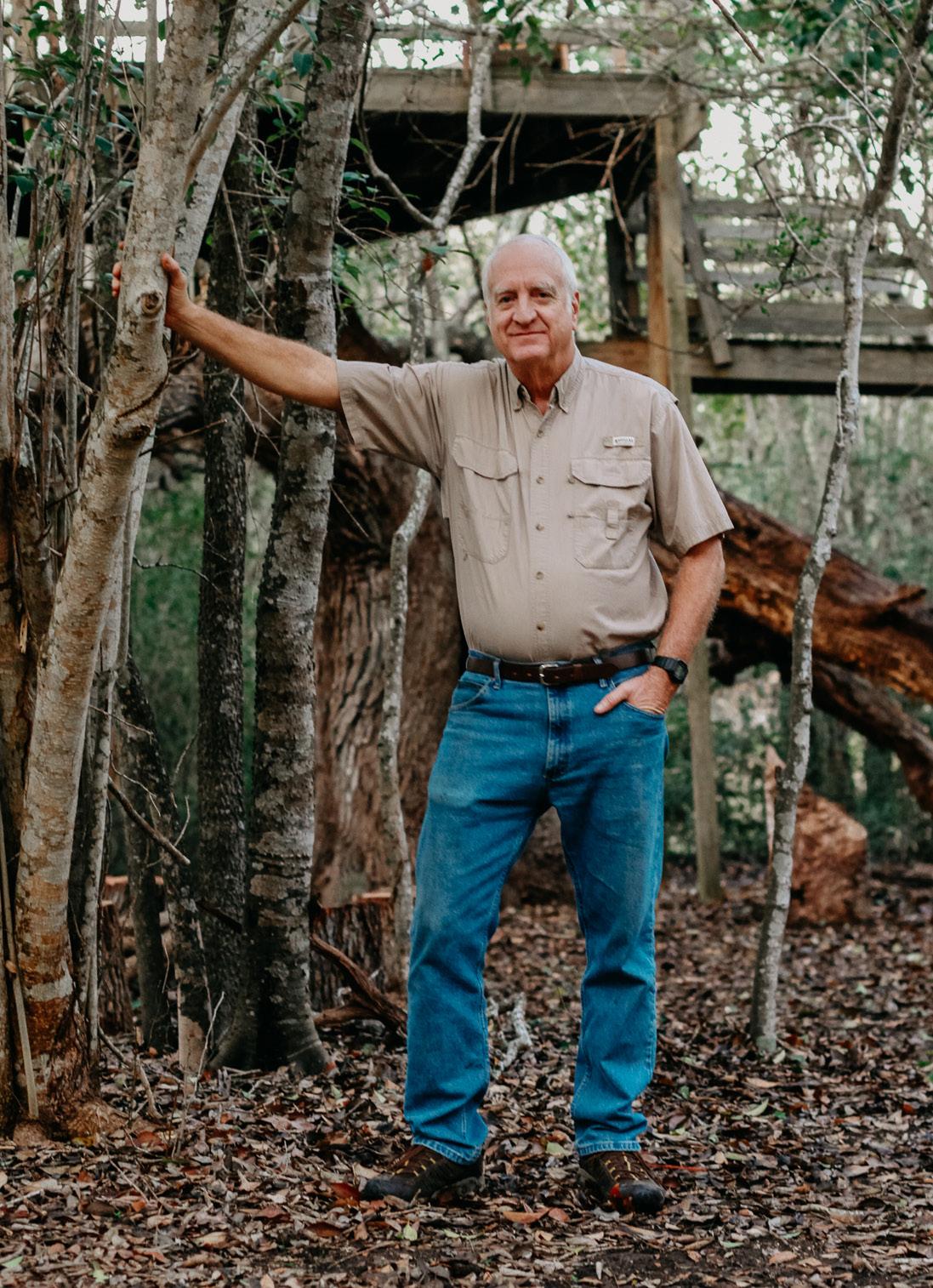
a steady stream of snacks. Christopher and Kyle climbed up the ladder wide-eyed. Monkey City was a pirate ship and a frontier fortress, an ancient castle and a Normandy bunker. It was anything and everything their minds could dream–-a sanctuary of imagination. The creation of Monkey City became an era-defining moment. Their time was tracked now by B.M.C. (Before Monkey City) and A.M.C. (After Monkey City).
The boys played on it and in it like it was their job.
When God placed Adam in the garden, he said it was very good. Or literally translated, “good good.” A kingdom of wonder laid out for his new creation. Adam’s first job was to name the animals. The same way a kid names rocks and hills and streams, Adam played his way through the garden naming his discoveries. Elephant, fox, wallaby, tiger. Caterpillar, kingfisher, swallow, lemming. Everything new.
There was no curse attached to work yet, so no distinction between work and play. No burden or weariness. No fear or exhaustion. Just a man delighting in the never-ending newness of the first garden. A delight only made better
when his helper and companion joined him as he walked with his Creator, naming creation.
Christopher and Kyle played like Adam before the fall, before fleeing east of Eden to the dry land beyond paradise.
That’s not to say there weren’t tears. Laura patched many wounds and removed many barbs, as well as fed cranky mouths, mediated brotherly spats, and provided pitchers of water and lemonade during the sweltering summer months. True play usually involves some tears, but they never lasted long. Within moments of the final sniffle, the boys would head back out to Monkey City, lost in their own personal Eden.
Doug, a man who never fully shed his boyish curiosity, often joined them in their play. He helped them line up their BB gun shots from the lower landing. Collected rocks to be stacked and stowed. Brought in sticks and branches for supplemental shelter. Became king or villain, whichever his boys required. His play followed him into his work, his home, his marriage, and his friendships. There was a good mischief behind his smile as he grew in age and wisdom, watching his family grow in delight.
The boys grew, and as they grew, Monkey City matured with them. It was about the same time cows broke through the back fence, prompting Doug and Laura to get rid of them and shift their acreage industry to growing hay. “All cows are essentially grass, so we just cut out the middleman and went straight to the source,” Doug said. “Besides, grass won’t eat my wife’s roses.”
They all knew there was a risk to adding a fourth and fifth level to Monkey City. You never know what’s happening inside a tree until it falls. But Christopher and Kyle convinced their dad the risk was worth it. That’s because they had a new obsession–paintball –and needed a better lookout. Doug was eager to oblige.
The two new levels gave Monkey City five distinct platforms. The tallest (aka the lookout) gave them a perfect vantage point to see beyond the thicket into the field, where freshly made bunkers hid friends with paintball guns waiting to attack.

The boys played on it and in it like it was their job.

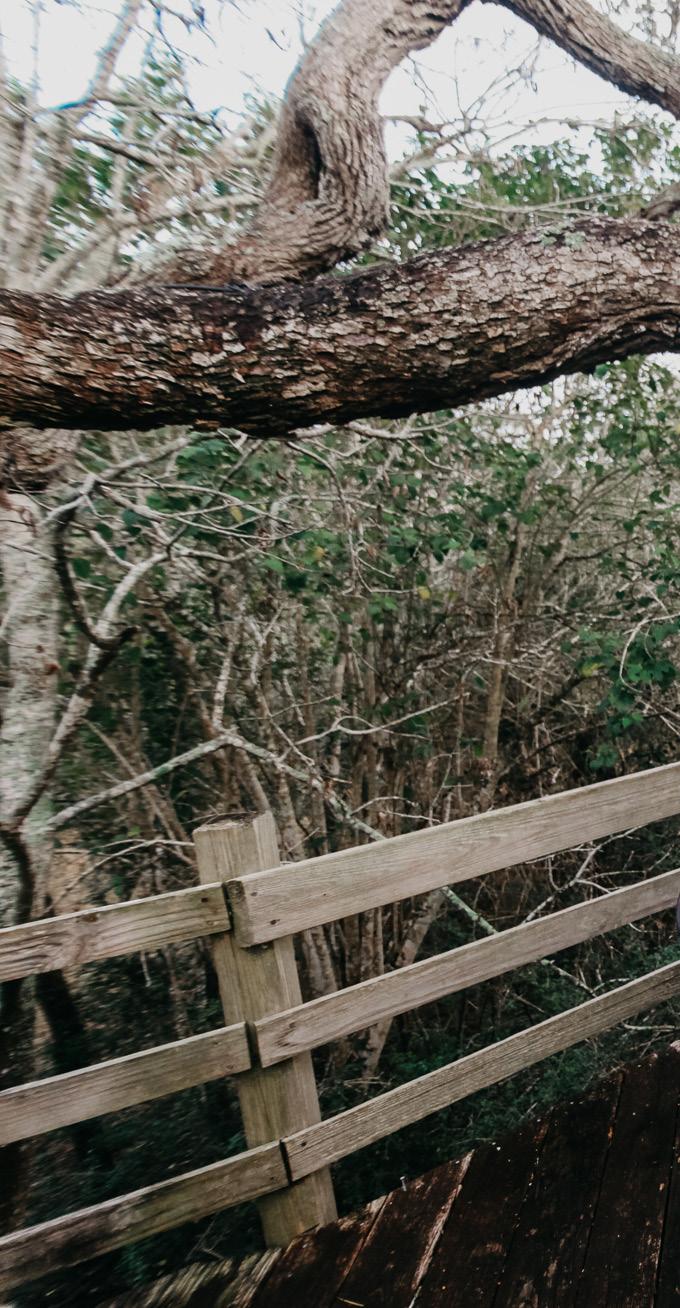

Doug camped with the boys the night of the grand opening of Monkey City 2.0. The smell of freshly cut two–by–fours hung in the air as he watched his boys fall asleep beneath the Texas stars. He thanked God for the stars and wondered if God smiled when he hid the bear and scorpion among the firmament. He thanked God that in a world so filled with pain, he could still find a quiet sanctuary with his two sons in a hundred-year-old tree, suspended above an earth longing for newness and a sky declaring his majesty.
The season of paintball lasted years and was a golden age for Monkey City. Boys from all over Shiner joined Christopher and Kyle after school and on weekends to suit up and wage war. There were nicknames, code words, battle plans. Teams shifted, allegiances formed, all with the same end game—take the tower.
Doug often suited up with them and, though not as fast on the charge, maintained his family honor with valor on the battlefield. Laura giggled at his welts and sore legs. She knew Monkey City was just as much his as it was his son’s, so she just smiled as he limped down the stairs the day after a paintball battle.
By then, Doug was doing less engineering and more managing others while they engineered. He, along with his brothers, now ran the family company. Kaspar Companies employed over 550 men and women and had shifted its focus from newsstands to truck beds, high-end grill guards, and an assortment of other metal goods. In many ways, it was a different Monkey City. The Kaspars were a family driven by curiosity, ingenuity, and grit. They adapted as life changed. They tried things, failed, tried again, and carved out success through a commitment to “figuring it out.”
They knew that failure to adapt was the death sentence of an old company, so they built it into their DNA. They invested in innovation (a grown-up word for play) and continued to expand their offerings.
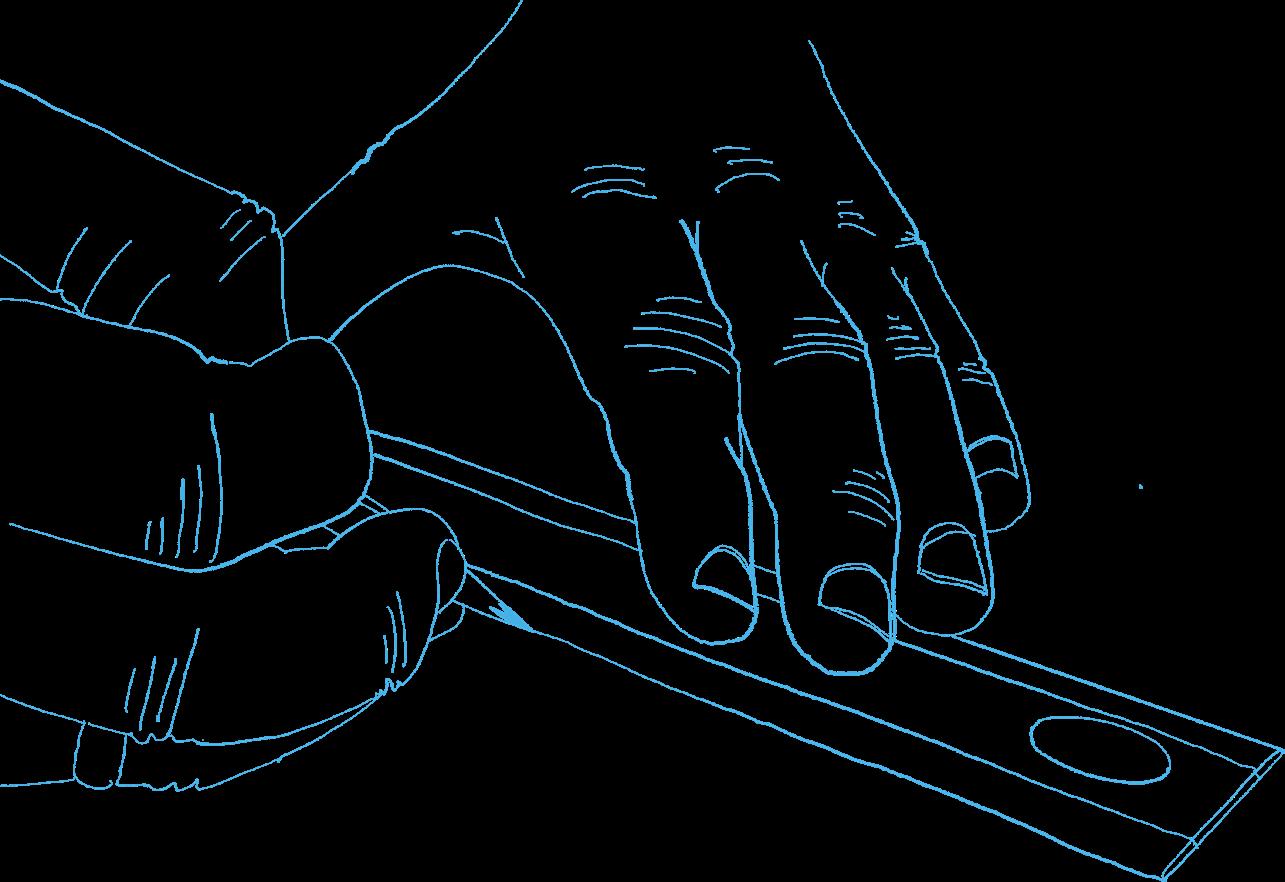
Almost intuitively, the Kaspars felt the tide again changing with Monkey City and knew it was time for another era. Christopher moved a grill onto the main deck while Kyle, who was almost as tall as Doug now, lugged a card table up the ladder. Doug helped them run power from the back deck to the lights strung through the branches. Laura found the card table and twinkle lights more inviting than a paintball mask and joined her boys for meals from time to time.
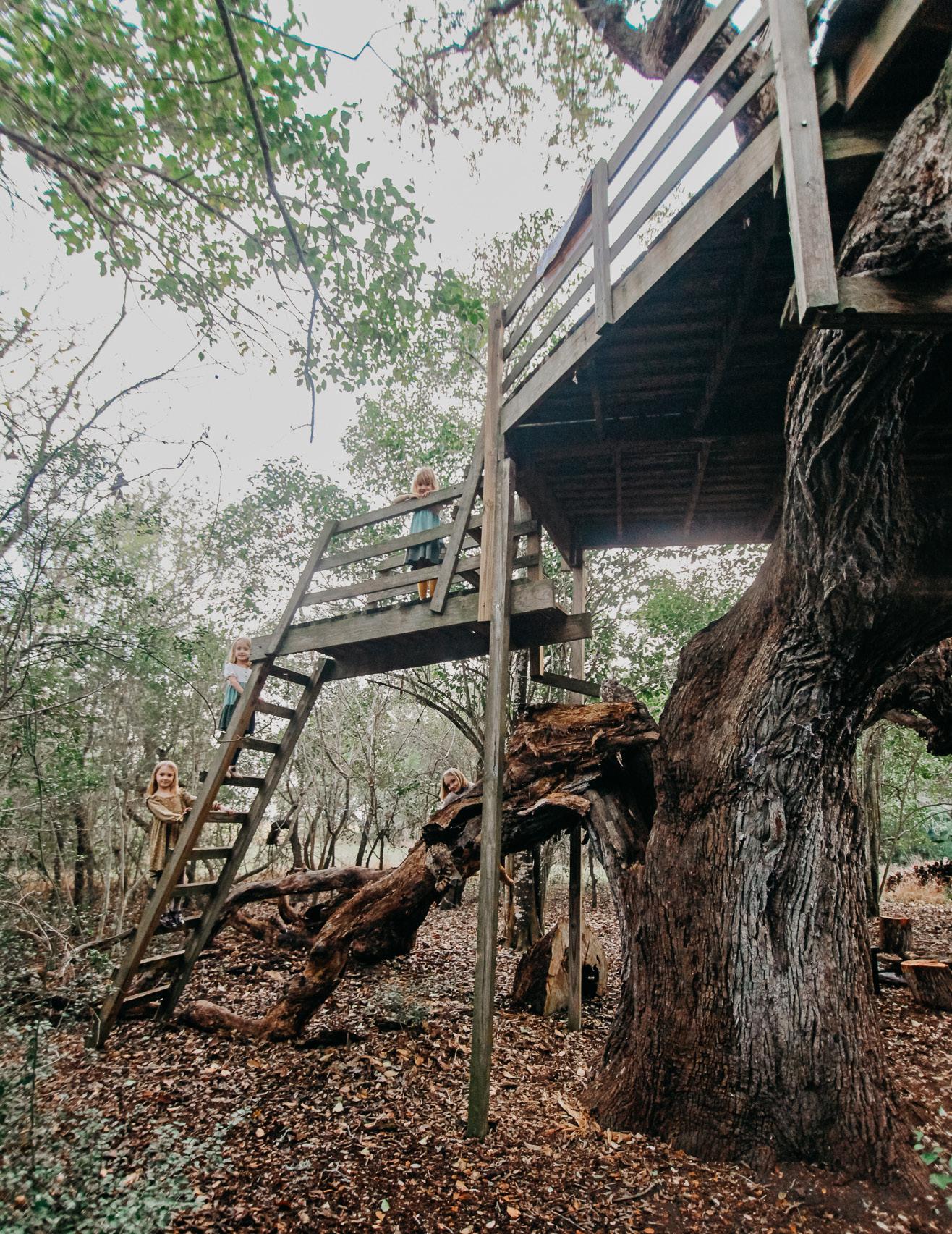
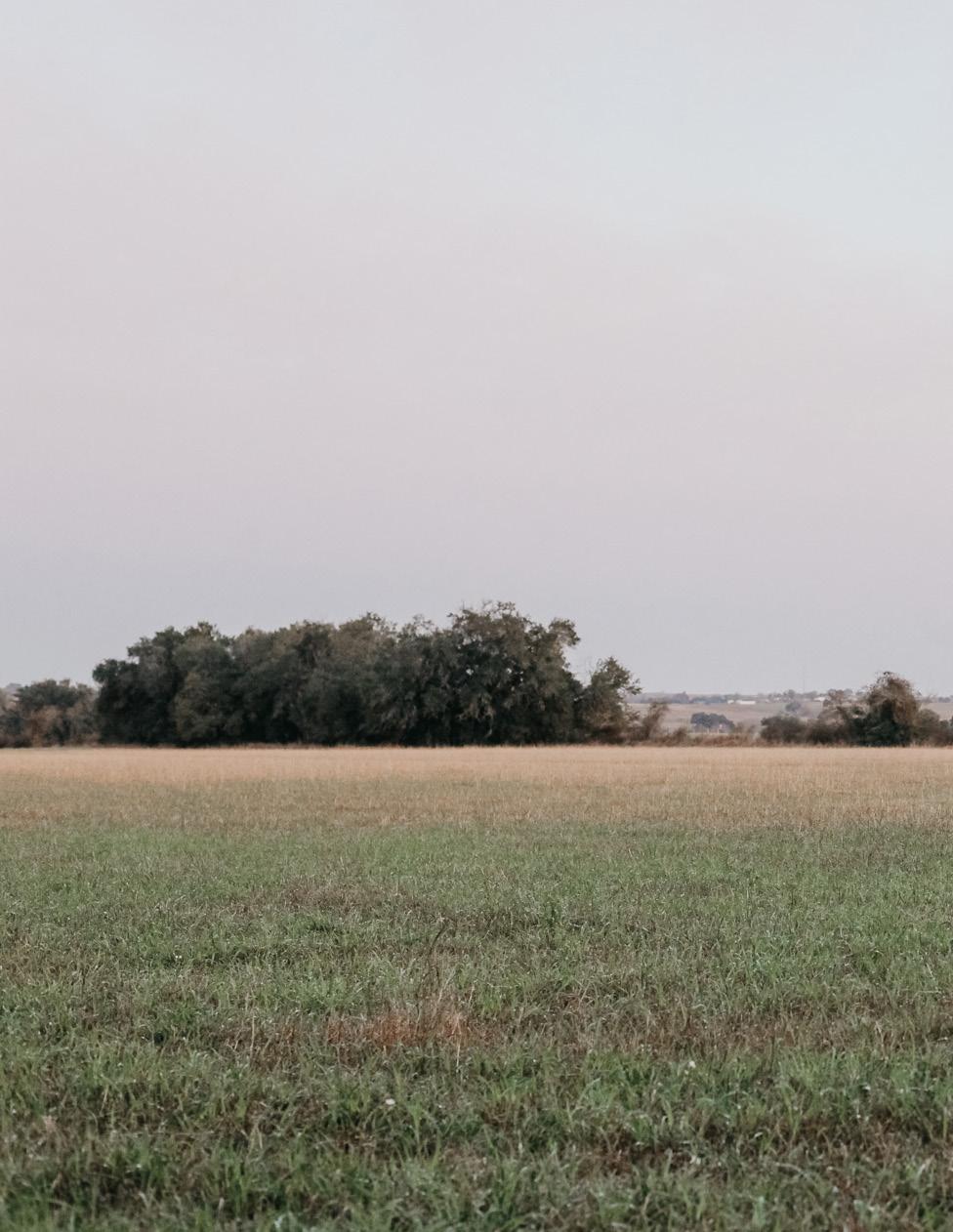

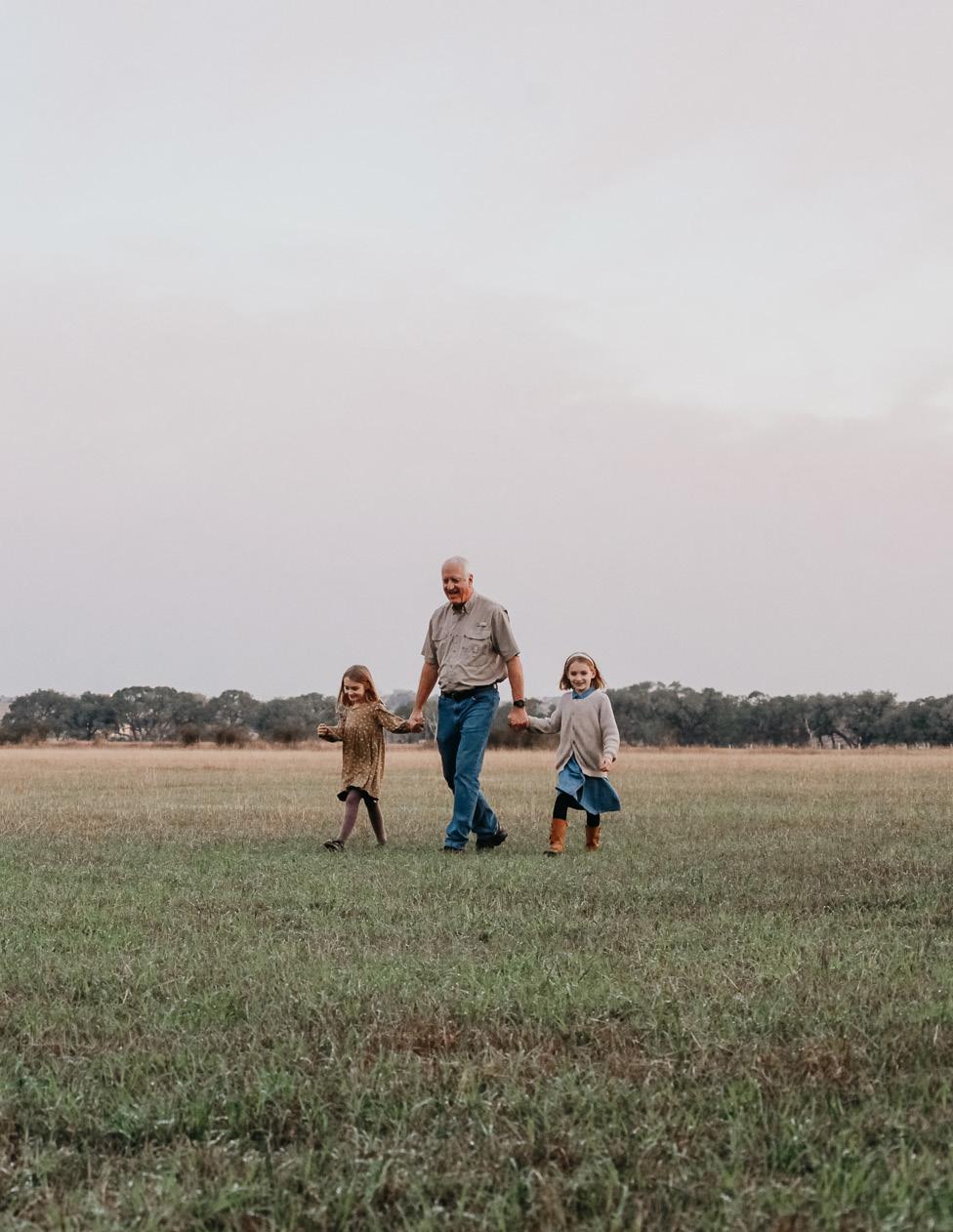
Christopher and Kyle hosted their friends for grilling and Texas Hold‘em. They played guitar and camped, dreamed of a big, beautiful world, and slept with youthful restlessness beneath the stars. Kyle became a local legend when he hosted his first date on Monkey City’s main deck. Laura taught him well, and news of his romantic chivalry spread like fire through the small local high school.
Doug still joined in, often a quiet smiling observer as his two almost men waxed on about the wild world they wanted to conquer.
When Kyle, their youngest, went to college, Monkey City fell quiet for the first time since its creation. Both Christopher and Kyle went about 100 miles north of Shiner to Texas A&M, another Kaspar family tradition. Apart from the occasional weekend laundry trip and the breaks spent at home, Monkey City stood unoccupied. Doug continued to check on it, replacing loose steps and making sure it was ready for the boys’ next visit. Over the years, Monkey City became as much an anchor for his play
as it had been for his boys, so the visits were maintained with the kind of regularity expected from an engineer. Most of the changes to Monkey City happened with intention over time. Slow interest or disinterest. Beta testing different ideas. Conversations. Plans. Dreams. But the next major era of Monkey City came without any warning, testing, or intention.
Big storms are a part of life in Texas. Clouds seen for miles spring open in seconds. Winds and rain and thunder and lightning engulf the land like dirt on a grave. That night, the storm was big but not unusual. Doug and Laura slept through the clambering downpour as they had hundreds of other storms.
In the same way the first storm acted without witness, the storm that night found its way to Monkey City unnoticed. Doug wasn’t sure if it was lightning, wind, or both, but at some point that night, the upper extension of the trunk, holding the top two levels, split, sending a good portion of the top of the tree along with the tower and lookout
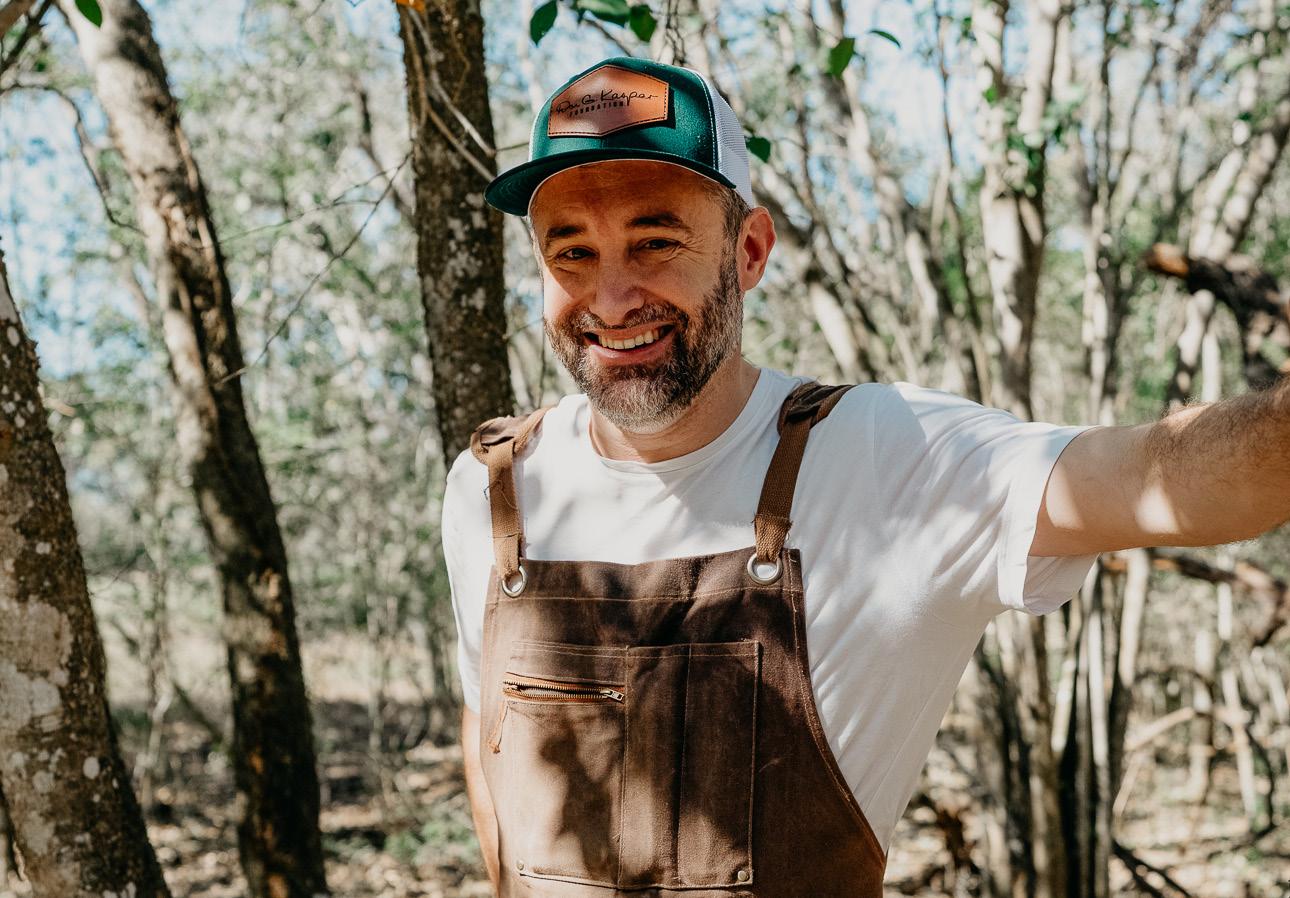
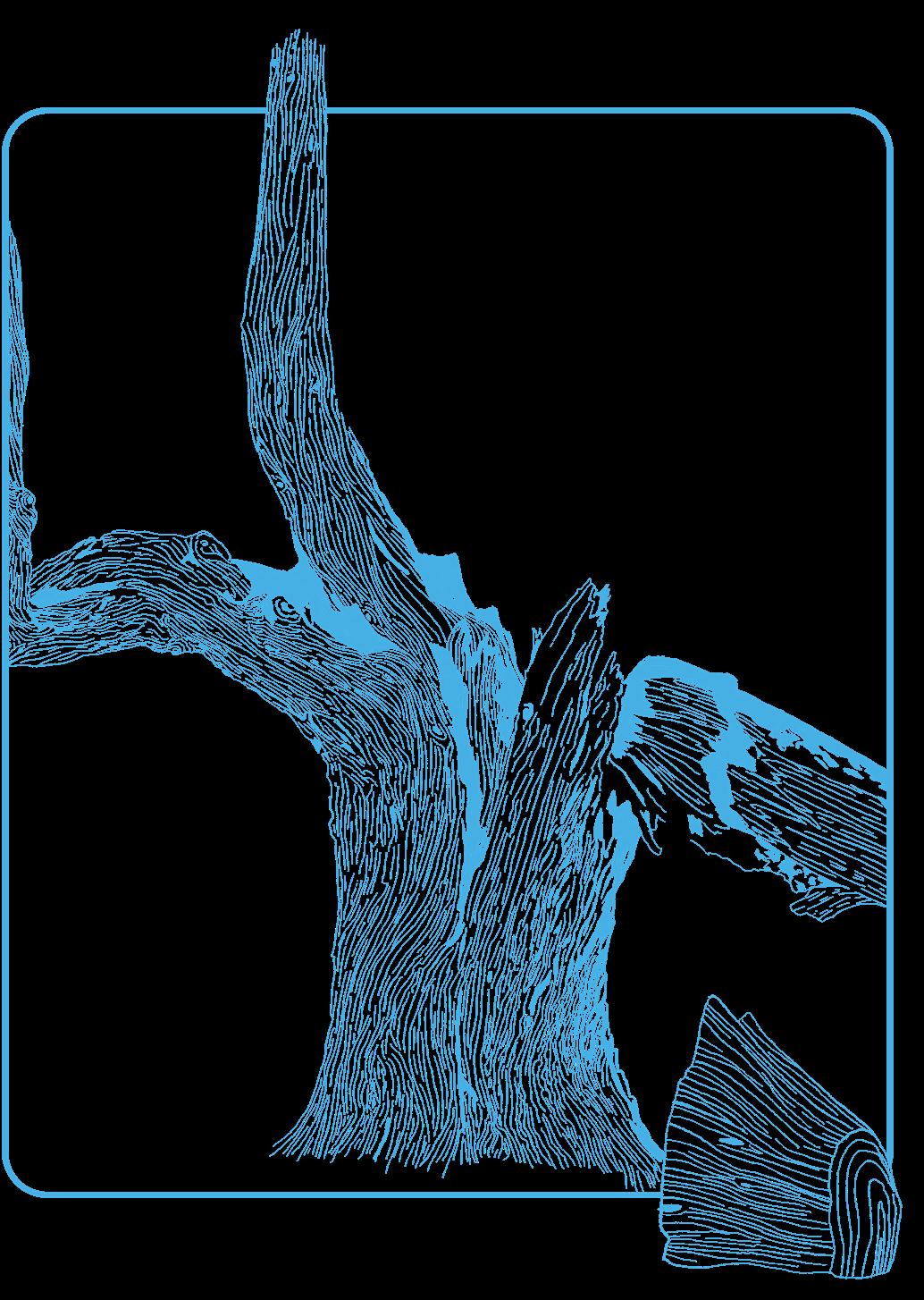
crashing to the ground. The fall damaged some bridges and landings and left a sea of leaves, twisted nails, and broken beams in its wake.
Over a century before, the sudden strike began to kill the interior of the tree. Decades of decay hollowed the live oak supporting Monkey City to the point where it just required enough weight, movement, and pressure to crack apart and fall.
The calls to Christopher and Kyle were brief and matterof-fact. This wasn’t the first tree to lose limbs or fall on their property. Most of the structure was salvageable. Nobody got hurt.
When the boys drove home that weekend, they took their time surveying the damage. The once–mighty extension of the trunk that had towered so high now lay in a U-shape
beside the base of the tree. Doug had already determined what he thought was salvageable. Some of the fallen structures would later become parts of docks and bridges at the family lake house, but for now they all lay in quiet repose in the thicket.
The fallen branch left an opening above them, allowing more sunshine into the leaf-covered floor than usual. The light helped the cleanup. Doug and the boys organized the irreparably broken pieces into a pile, used hatchets and clippers to clean the fallen branch, and inventoried the full scope of the damage.
They worked in focused silence, grieving the loss. It was the first real trace of brokenness seen in their Eden. The first hint of the serpent and all his consequence. Any hope for future generations of Kaspars peering above the tree line to the paintball fields was dashed into piles of limbs and leaves. There was no more tower to storm.
What happened next varies depending on who tells the story. Doug, Christopher, and Kyle each claim it was their idea. Some stories cite the smell of chimney smoke from the main house; others attribute the idea to the pile of useless debris and the need for its disposal. Regardless of who said it or why, the next era of Monkey City struck the Kaspars like the lightning that set the stage for it.
From its beginning, there was always one glaring omission to the entire experience. Because of the thickness of the live oak’s crown and the youpan bushes surrounding it, the Kaspars could never build a fire pit within the Monkey City compound. Fires were relegated to the open field beside it.
With the clearing complete, the U-shaped fallen trunk created a perfect sectional sitting area beneath the newly created opening above them. It’s unlikely they could have planned a better fire pit if they tried.
Without conversation, they all went to work clearing the brush, gathering stones for the fire circle, and chopping the debris into 12-inch logs. When the transformation was finally complete, Laura brought food out for her hungry men. The Kaspars sat around the glowing embers enjoying their first meal together in the newest chapter of Monkey City. It was a taste of the morning joy following a mournful night. The smoke billowed through the canopy toward the stars, the debris pile diminished to traces of ash and ember, and the spark of hope lit their faces.
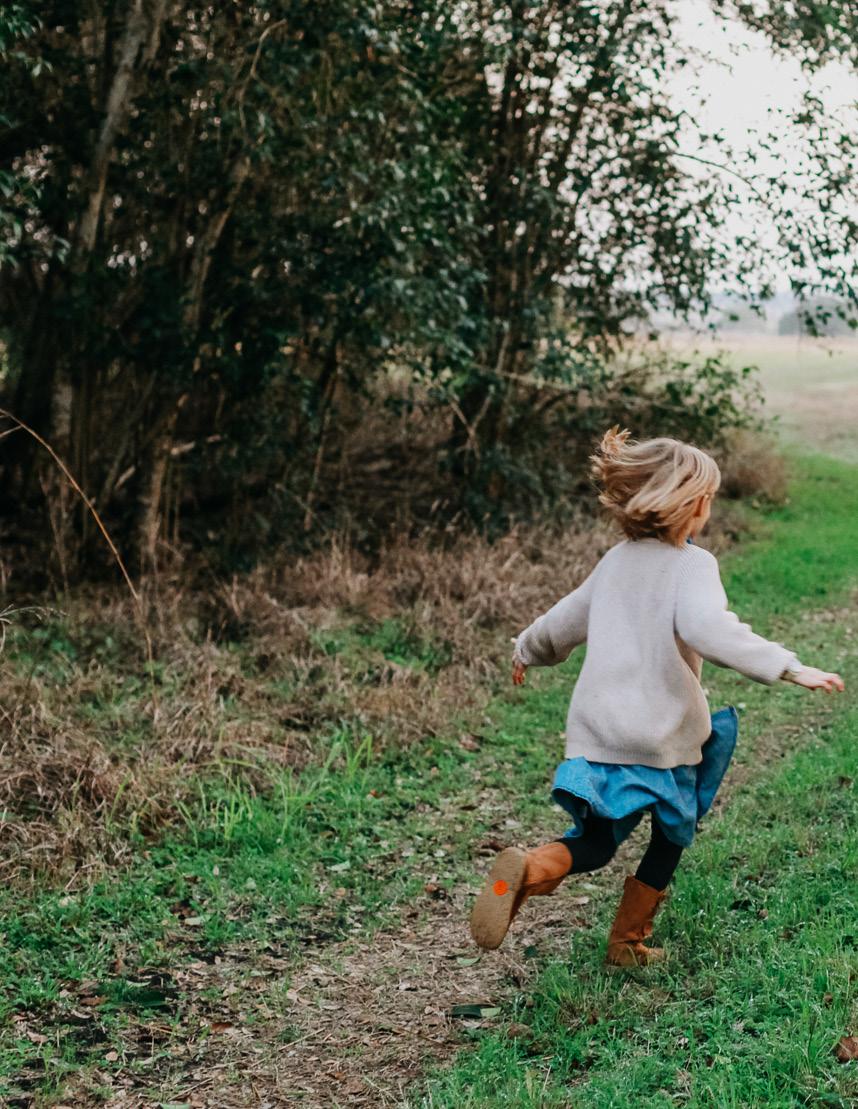

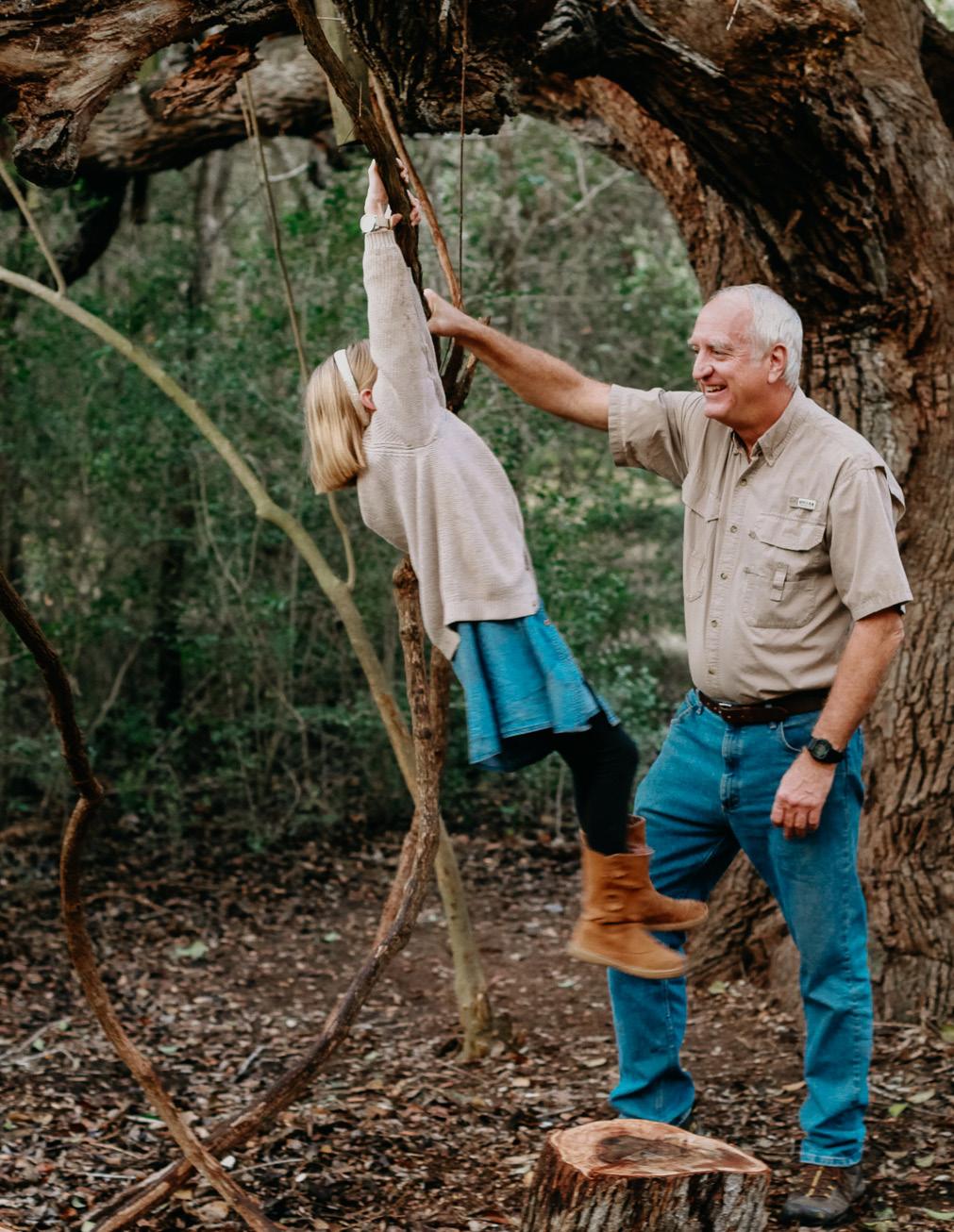
Over the years, Monkey City became as much an anchor for his play as it had been for his boys...


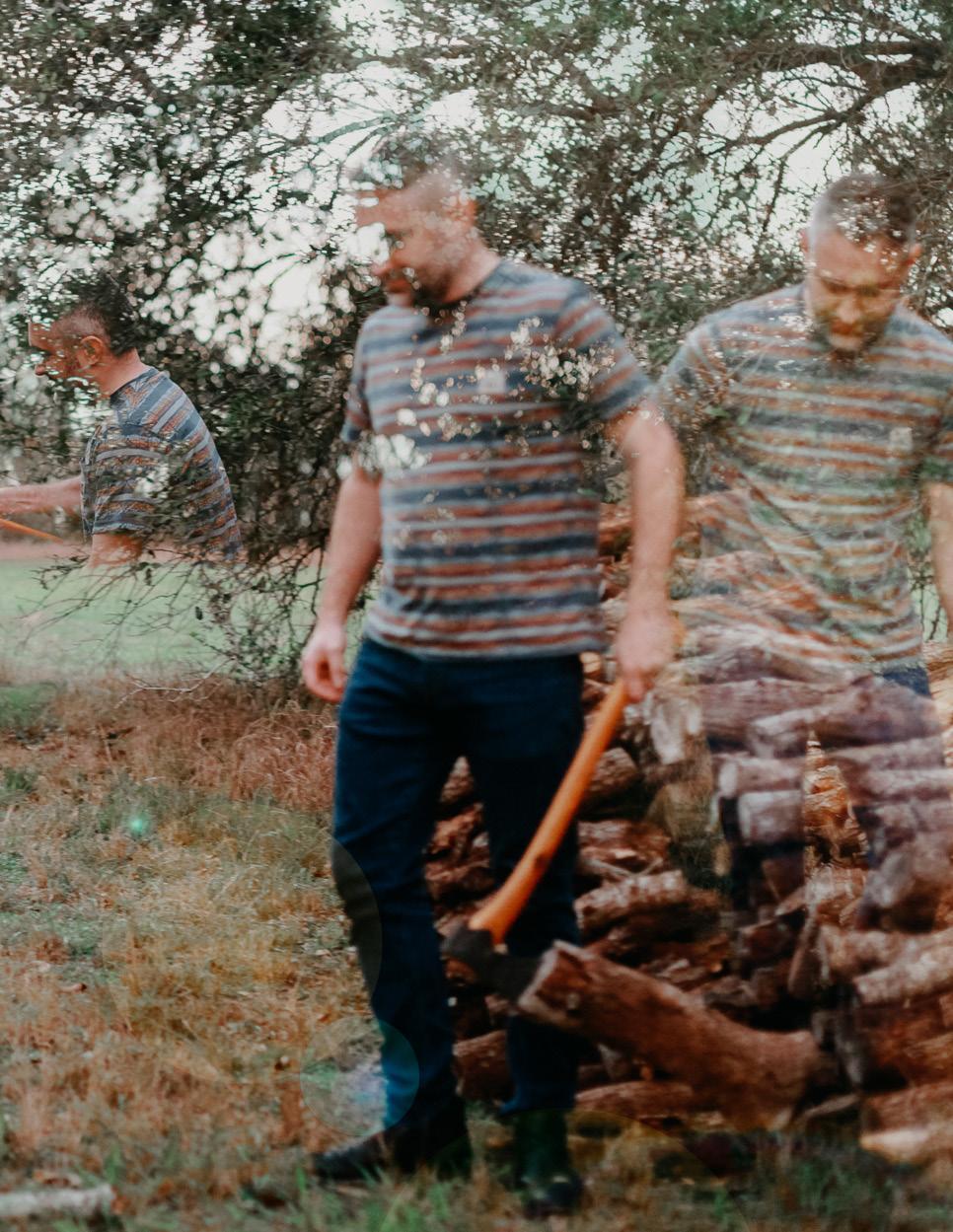
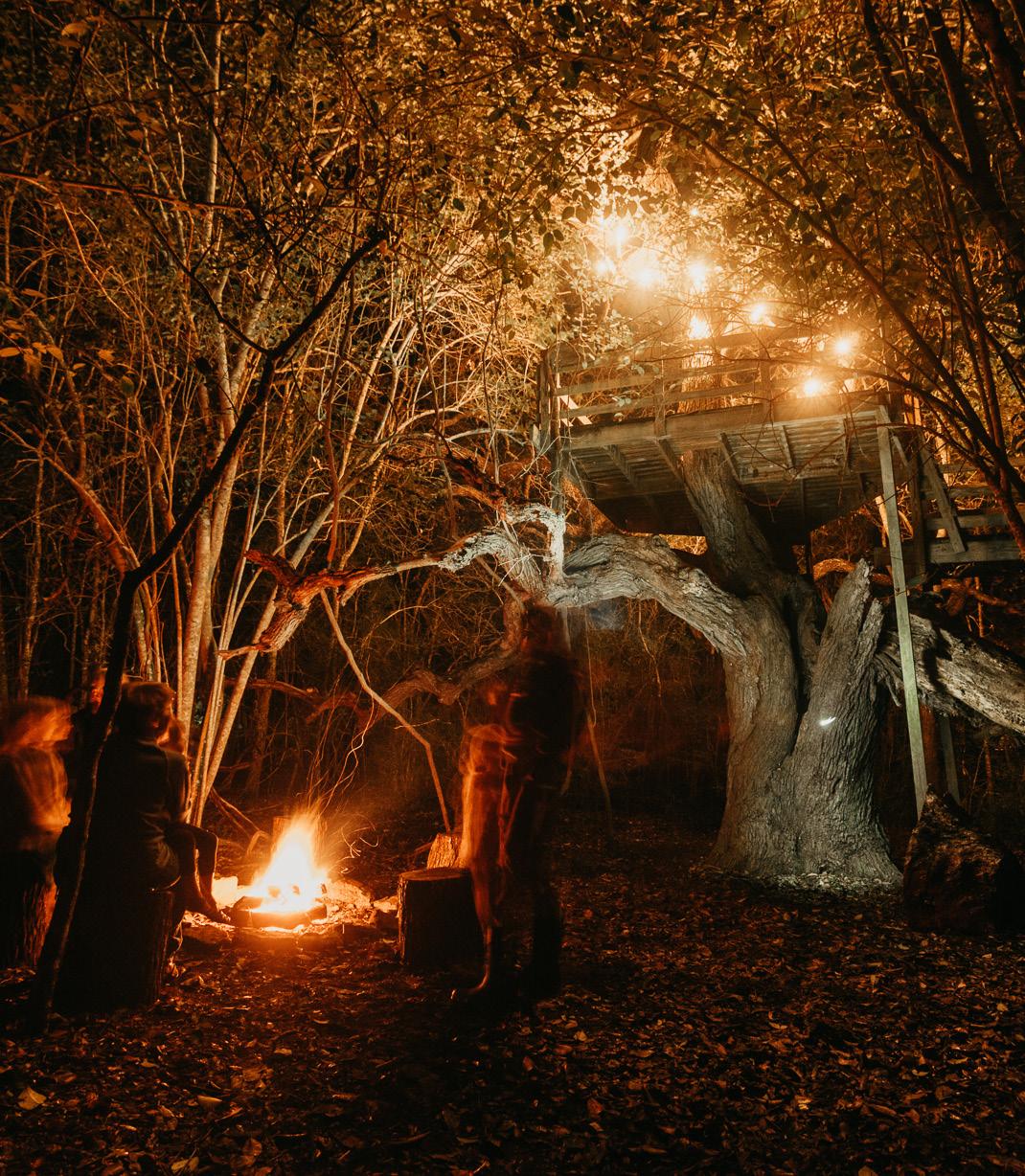
Monkey City still stands, tucked away within the graceful acres of a land well-loved. Kyle and his wife, Jennifer, travel down from Dallas to pay homage as often as they can. Each visit includes
A life committed to wonder and play never sees suffering and struggle as an end. Just a change of scenery. Somehow, the brokenness brought a wholeness only the God of storms could engineer.
Christopher and his wife, Sierra, moved into their greatgrandfather’s home in Shiner, where they are raising six children–four girls and the younger two boys. Three of the kids were born in the same room where the greatgrandfather died decades before.
Doug and Laura, to no one’s surprise, are natural grandparents and often host the grandkids. The two oldest girls are around the same age as Christopher and Kyle when Doug built Monkey City.
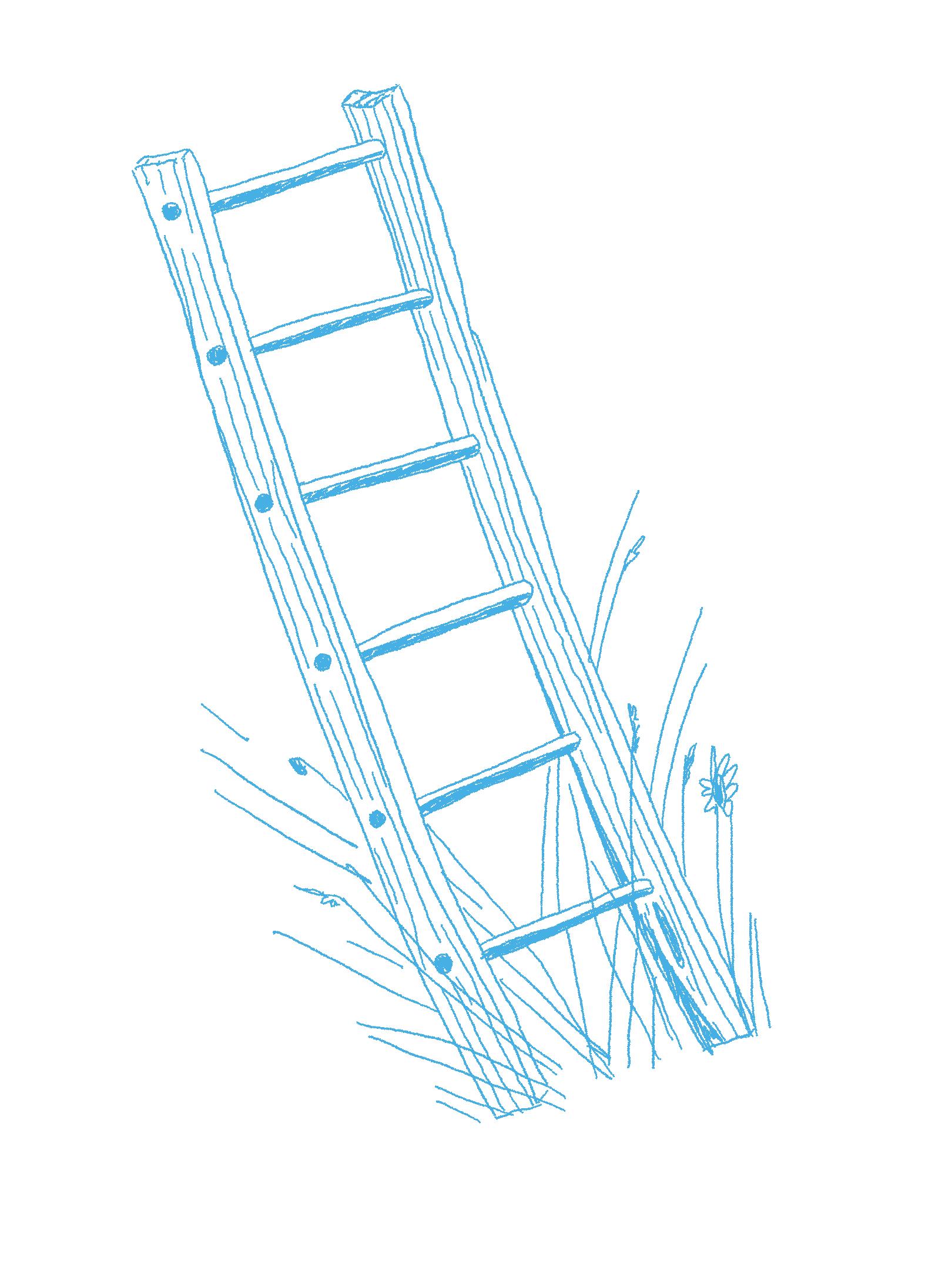
When the two girls first discovered the wood-rung ladder hiding in the thicket, Doug felt a new version of the story was starting. He knew this wasn’t the last chapter in the Monkey City epic, just the next one. Now, the platform that once housed BB guns, rocks, and paintball remnants is home to fairy godmothers, unicorn cities, and a prairie home. Grandfather Doug climbs the ladder with them and delights in the difference in play.
On a clear evening last September, Doug hosted the two oldest granddaughters’ first campout in Monkey City. The sleeping bags lay naturally upon the landing as he regaled them with stories of their father and uncle. He told them about the trees and the creatures. When the stories were finished, he watched them as their wonder-filled eyes looked toward the stars and then finally closed in sleep.
Doug thanked God. He thanked him for the generations that brought him to this moment. He thanked him for the roots and the soil. The stars and the moon.
Doug thanked God that even in a broken Eden, he could
C.C. Kimmel is the executive director of Gracebased. He is a writer, musician, former Lightcatchers . He lives in Portland, Oregon, with his wife, four kids, and a big dog named Wendell and a kitten named Ruby.
